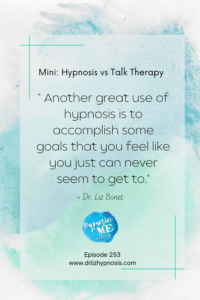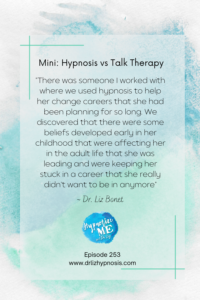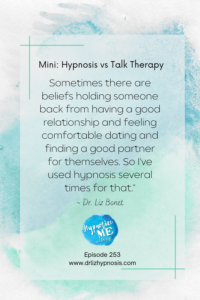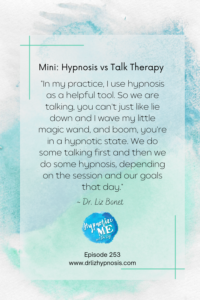In this Mini episode, Dr. Liz talks about the differences between Hypnosis and Talk Therapy; who should NOT do hypnosis and when it CAN be helpful.




About Dr. Liz
Winner of numerous awards including Top 100 Moms in Business, Dr. Liz provides psychotherapy, hypnotherapy, and hypnosis to people wanting a fast, easy way to transform all around the world. She has a PhD in Clinical Psychology, is a Licensed Mental Health Counselor (LMHC) and has special certification in Hypnosis and Hypnotherapy. Specialty areas include Anxiety, Insomnia, and Deeper Emotional Healing.
See more about Dr. Liz and get Free hypnosis files at http://bit.ly/drlizhypnosis
————–
Do you have Chronic Insomnia? Find out more about Dr. Liz’s Better Sleep Program at https://bit.ly/sleepbetterfeelbetter
Search episodes at the Podcast Page http://bit.ly/HM-podcast
Help yourself with Hypnosis Downloads by Dr. Liz! http://bit.ly/HypnosisMP3Downloads
———
A problem shared is a problem halved. In person and Online hypnosis and CBT for healing and transformation. Schedule your free consultation at https://www.drlizhypnosis.com.
Listened to in over 140 countries, Hypnotize Me is the podcast about hypnosis, transformation, and healing. Certified hypnotherapist and Licensed Mental Health Counselor, Dr. Liz Bonet, discusses hypnosis and interviews professionals doing transformational work
Thank you for tuning in! Please subscribe to auto-download new episodes to your listening device.
Check out this episode!
Transcript
Hey everyone. Dr. Liz here. This is a mini-episode answering the question of when is hypnosis appropriate versus regular talk therapy. This is a great question. They don’t recommend hypnosis for someone who is schizophrenic or having some psychosis. Delusions. Hallucinations, that type of thing. They often don’t recommend it for someone who has borderline personality disorder, although I would completely disagree with that.
I am trained in Dialectical Behavior Therapy, which originally was developed for suicidal people and BPD, borderline personality disorder. And I think if you know how to work with BPD, you can use hypnosis for wonderful effects to help them regulate, decrease anxiety, decrease depression, all kinds of stuff.
So I would say maybe the typical practitioner shouldn’t do that, but if you have training specifically for BPD, then it would be a good tool to use.
The other type of people that hypnosis is not really good for is people who have a really difficult time. Going into hypnosis. Now that may be due to several factors.
Sometimes that is anxiety and we have to bring the anxiety down enough for them to be able to go into a more relaxed state. So we start with talk therapy since I’m an Anxiety Specialist, and then we can do some hypnosis later if they want that. The other type of person is like someone who has a really difficult time relaxing.
If you show up in my office and you really want hypnosis and you are having an extremely difficult time relaxing, believe me, I will work my butt off for you, to help you go into hypnosis or learn some skills so that we can actually do that. So there’s some, there’s some like smaller, mini skills that people can practice at home that then allows them to do a longer hypnosis.
Now that we’ve talked about who shouldn’t do hypnosis, let’s talk about who it can be helpful for. Maybe you’ve been through several types of therapies and or cognitive behavioral therapy, CBT, and find that perhaps they’re helpful, but you’re still not where you want to be. Or maybe they weren’t helpful.
You might want to consider hypnosis. I think it is really helpful for someone who feels like they have some trauma in their history that has not resolved something that’s back there that’s still determining their actions that they feel like they can’t help themselves.
An example of this is someone who’s trying to leave a relationship knows it’s not good for them, but keeps going back to that.
Another example is often with eating, overeating or bingeing, is often associated with trauma in someone’s history.
Not always, but sometimes another great use of hypnosis is to accomplish some goals that you feel like you just can never seem to get to. So there was someone I worked with where we used hypnosis to help her change careers. And she had been planning this for like, I don’t know, five years or something, and just couldn’t make it happen. And we really discovered that there were some beliefs developed early, early in her childhood that were affecting her in her very adult life that she was leading, that were keeping her stuck in a career that she really didn’t want to be in anymore.
In the same vein, sometimes there’s beliefs holding someone back from having a good relationship and feeling comfortable dating and finding a good partner for themselves. So I’ve used hypnosis several, several times for that. Like, yeah, let’s get you hooked up here. You want to date a really good person who’s honest and compassionate, and likes to travel. I don’t know. Everyone has their own thing.
I have them actually make a list of what are your top 10 qualities that you’re looking for? Let’s be very specific so that we do change the beliefs going on. We do change the subconscious mind. We align it with these goals now so that you partner well and you feel happy moving forward in that area.
So I would say that’s a big use of hypnosis versus simply talk therapy. Now sometimes you just want to talk some things out, get some perspective, do that type of thing. Um, that’s totally fine. I do that in my office as well. And even when I go to therapy sometimes I want hypnosis, but like I did around like last year, Was it last year?
Yeah, I think last year where I just needed to talk about some things and get some perspective and honestly get some education about an area that was affecting my life that I didn’t really know a whole lot about. And it wasn’t the type of thing that I could just Google and get the answers to. It was I really needed to talk to a specialist and get some answers to some questions, and that was really helpful. We never did hypnosis, even though the person I went to was actually trained in hypnosis. We just did talk therapy and that was helpful for me and that was that.
In my practice I use hypnosis as a helpful tool. So we are talking, you can’t just like lie down and I wave my little magic wand and boom, you’re in a hypnotic state.
We do some talking first and then we do some hypnosis, depending on the session and our goals that day.
So I hope that helps you understand when is hypnosis versus talk therapy appropriate. If you have any other questions, please drop me an email. I will be happy to try to answer them.
I’ll right everyone. Have a wonderful day. Peace.
I hope you truly enjoy today’s episode. Remember that you can get free hypnosis downloads over at my website, dr liz hypnosis.com, D R L I Z hypnosis.com. I work all over the world doing hypnosis, so if you’re interested in working with me, please schedule a free consultation over at my. And we’ll see what your goals are, and if I can be of service to you in helping you reach them.
Finally, if you’d like today’s episode, please subscribe to the podcast or tell a friend. That way, more and more people learn about the power of hypnosis. All right, everyone have a wonderful week. Peace. This podcast is not mental health treatment, nor should it replace mental health treatment. If you need therapy or hypnotherapy, please seek treatment from a trained profess.







